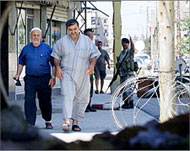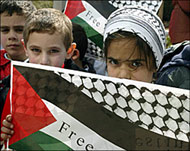Poverty trap for Palestinian refugees
Amal Akar lost a daughter to cancer two years ago because she could not afford medical treatment. Now a second daughter faces the same fate.

More worryingly, Akar’s story is not uncommon. The 36-year-old mother of seven lives in the deprived Shatila camp for Palestinian refugees in Lebanon where poverty is the norm.
With the limited assistance offered by the UN refugee agency and a jobless husband, she is virtually penniless.
“We borrowed money and I sent letters to newspapers asking for help to no avail. I don’t know what to do,” she said, while carrying a crying baby in her arms.
Job bans
Part of the problem is that refugees are restricted from taking certain posts.
These restrictions on Lebanon’s 400,000 Palestinian refugees have been mounting since the end of the country’s 15-year civil war in 1990. They are banned from 73 job categories including professions such as medicine, law and engineering.
They are not allowed to own property, unlike other foreigners, and are denied access to the Lebanese healthcare system.
Shatila’s homes are densely packed and neglected with narrow, stinking alleys, the dirty walls covered with posters of smiling men killed during the Palestinian Intifada.
“I don’t mind going anywhere in the world, just get me out of here,” says Akar. “I don’t want to settle in Lebanon. All that we have here is trouble and poverty.”
Few choices
But who said settling was an option?
The Lebanese government has said repeatedly that it will not allow Palestinian refugees to settle. It says that granting them work permits and rights to own land will encourage them not to leave and jeopardise their right of return.
|
“I don’t mind going anywhere in the world, just get me out of here” Amal Akar, |
Local analysts, however, attribute this stance to political reasons, saying that the refugees’ Sunni Muslim majority will upset the balance of sectarian power in the country, currently in the favour of Lebanon’s Shia. They also argue that Palestinians are paying the price of the influx of Syrian workers who do not need work permits in Lebanon due to the huge Syrian influence in the country.
“They [the government] consider these things as acts of settlement. Do they think that if I work or own the roof above my head then I won’t go back home?” said Khalid Abu al-Nur, of the Democratic Front of the Liberation of Palestine, one of many Palestinian groups that has an office in the camp.
“These are lame excuses. We are talking about basic human rights. Refugees in Syria and Jordan are entitled to these rights. What’s so special about Lebanon?” he said.
Camp life
According to refugees, those living in other camps are not allowed even to obtain construction tools such as cement to fix their houses.
“We can only do this here because we have Syrians living in the camp,” said Ahmad Abd al-Hadi, referring to the Syrian influence in Lebanon.
 |
|
The entrance to the Ain al-Hilwa |
Refugees in Lebanon live in 12 camps nationwide. According to the UN Relief and Works Agency for Palestine Refugees (UNRWA), the largest camp is Ain al-Hilwa, located in the southern city of Sidon (48km south of the capital) and famous for armed conflicts among various factions of Palestinian groups. It houses 75,000 refugees.
The second-largest camp is Nahr al-Barid in northern Lebanon with some 29,000 registered refugees, while the Shatila camp houses just more than 12,000 refugees.
In 2003, heavy opposition by the government thwarted a draft law presented by 10 members of the parliament that would allow each Palestinian the right to own 5000sq m in Lebanon like other foreigners.
Suffering
“We are against settling the Palestinians, but they are suffering from a great deal of injustice here and they need to have their basic rights as humans,” said Muhammad Khansa, a Hizb Allah official and a chairman of the Ghubairi municipality where the Shatila camp is located.
 |
|
If Palestinians settle in Lebanon |
Apart from the lack of basic services, people are finding it harder to secure food. Umm Rashid, a 69-year-old mother of seven, is classified by the UNRWA as a “special hardship case” or as UNRWA spokeswoman Huda al-Tirk puts it: “the poorest of the poor”.
She lives on minimal financial aid and a package of basic commodities provided by the agency, along with a $30 monthly salary paid by the Palestinian Liberation Organisation (PLO) for the loss of one of her sons during the conflict with Israel.
But to make ends meet in a country where the minimum wages stand at $250 per month, she sells tools and groceries.
Scraping by
Other people run small stores inside the camp, or cross the road to find jobs in neighbouring areas, benefiting from Khansa’s sympathetic “turn a blind eye” policy.
“The Lebanese hire Palestinians because they don’t require any kind of medical or social securities, and they can work for as long as 12 hours a day without complaining,” said Nuhad Hamad, a middle-aged Palestinian woman who runs a local institute that provides basic vocational training and educational services to the camp’s inhabitants.
UNRWA also provides jobs opportunities to the Palestinians, employing more than 2000 health and educational staff in its schools and clinics.
“We know it’s little but this is what we can do,” al-Tirk said, citing the rising population in the camps as one of the main obstacles against providing more services.
Budget
The agency’s budget is dependant on donors from the US, the European Union and other countries, al-Tirk says. The 2004 budget is $351 million, $53 million of which is for Lebanon-based camps.
|
“We sometimes deduct from our salaries to keep the courses running” Nuhad Hamad, |
Palestinian organisations, including Hamad’s Najdeh institute, try to fill the gap. It provides vocational training, literacy courses, private tutoring and a children’s nursery. Classes, however, are modestly equipped and some courses stop due to a lack of funding.
Teachers are university graduates unable to find jobs elsewhere. They work for $3 per day.
“But we sometimes deduct from our salaries to keep the courses running,” Hamad said in her small office, where a map of the occupied territories stood to remind her of a home she never saw.
Students are reminded, too.
Each class has a poster listing the students’ names and their origins in Palestine. Some of them do not seem to need the reminder, though, such as 13-year-old Sally al-Lahham, who drew a picture of a woman drying her clothes in the open air next to a tent.
Asked about the meaning of the picture, she replied with a smile: “It resembles the displaced Palestinians.”